Starships are so last century. Hey, I’m the first to admit that they look neat on the big screen, but in written fiction spaceships stopped doing it for me a while ago. Same with dystopian futures and post-apocalyptic nightmares. Why read about dystopias when I can just drive into town?
But, oh, the broad, glorious, panoramic sweep of history—that’s where it’s at! History is the big playground. In bitter reality most of history was brutal and unpleasant, inexplicable and capricious, but reimagined by a good writer it can be fascinating. For me, history is always new.
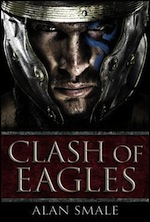 Speculative historical fiction is a house with many rooms. In the very proper living room you’ve got your straight historical fantasies and your meticulously-planned alternate histories. In the slightly wacky dining room you have time travel, and mirror universes, and timeslips where large populated chunks of the present day slide off the table and crash back into the Thirty Years War or the Bronze Age. The secret histories are off muttering to each other on the basement stairs. And yukking it up in the kitchen you’ve got steampunk and dieselpunk and weird westerns and flintlock fantasies. Over in the den you’ll find action-adventure tales that play fast and loose with the facts, giving you the Romans invading North America in the 13th century (as in my own novel, Clash of Eagles), or the Napoleonic wars with dragons added, because why not? I’ve been reading and writing in some of those subgenres myself for fifteen years or more—and I adore all of it.
Speculative historical fiction is a house with many rooms. In the very proper living room you’ve got your straight historical fantasies and your meticulously-planned alternate histories. In the slightly wacky dining room you have time travel, and mirror universes, and timeslips where large populated chunks of the present day slide off the table and crash back into the Thirty Years War or the Bronze Age. The secret histories are off muttering to each other on the basement stairs. And yukking it up in the kitchen you’ve got steampunk and dieselpunk and weird westerns and flintlock fantasies. Over in the den you’ll find action-adventure tales that play fast and loose with the facts, giving you the Romans invading North America in the 13th century (as in my own novel, Clash of Eagles), or the Napoleonic wars with dragons added, because why not? I’ve been reading and writing in some of those subgenres myself for fifteen years or more—and I adore all of it.
But walk a few paces further, actually so many paces that we’re out the back door and through the yard and into the woods beyond, and there you find the really twisted historical fiction. The authors who push it further, who throw everything in there at once, who bend history until it almost snaps. Wildly inventive books that get unashamedly meta, books that possess a sometimes offbeat internal logic but still harness the gravitas and powerful resonances of history. Witty books that often swerve into satire without ever collapsing into parody.
Here are five speculative fiction novels that twist history until it begs for mercy:
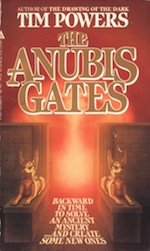 The Anubis Gates—Tim Powers
The Anubis Gates—Tim Powers
Tim Powers’ masterpiece throws Egyptian sorcerers, Romantic poets and a grab-bag of other fantastical elements into a heady time-travel fantasy. It’s a fever-dream trip through the 1800s and 1600s with a plot that almost defies description, which is why I won’t try. Manic, extremely evocative, and―despite all the fireworks and head-spinning flourishes―meticulously plotted.
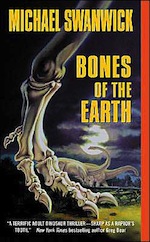 Bones of the Earth—Michael Swanwick
Bones of the Earth—Michael Swanwick
The mysterious Harry Griffin walks into paleontologist Richard Leyster’s office at the Smithsonian with a freshly-killed stegosaurus head in his cooler. Aliens have gifted humanity with time travel, for as-yet obscure reasons, and we’re off to see the dinosaurs… but in Swanwick’s hands we’ll also be treated to an audacious timey-wimey spaghetti, as characters knowingly meet their younger and older selves again and again in a series of extravagant temporal whorls. And that’s not even the most inventive part of the novel.
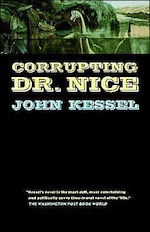 Corrupting Dr. Nice—John Kessel
Corrupting Dr. Nice—John Kessel
Time travel with con artists. Corrupting Dr. Nice jumps from Roman Jerusalem to the Cretaceous, and then yanks historical characters out of their own times and into a future where Voltaire might become a talk-show host and Jesus and Abraham Lincoln take part in a gripping courtroom drama, Kessel’s novel is surely the ultimate screwball satire on the exploitation of the past.
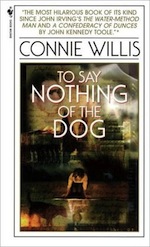 To Say Nothing of the Dog—Connie Willis
To Say Nothing of the Dog—Connie Willis
Choosing between the books in Willis’s loosely-connected time travel sequence was well-nigh impossible, but in the end I went with Dog. In trying to prevent time from being torn apart, Ned Henry has ended up in 1888 lost and confused, his own mission largely a mystery to him. Chaos theory then mingles with a comedy of manners on the River Thames. Dog doesn’t contort history into a pretzel quite the way the others do, although it certainly has some really good torquing in it. Instead, it lures the unsuspecting reader in, piling layer upon layer, artfully concealing most of its intricacy until the final mystery is revealed…
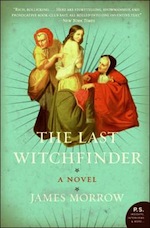 The Last Witchfinder—James Morrow
The Last Witchfinder—James Morrow
Unlike the others The Last Witchfinder contains no time travel, but is a masterful romp through Restoration England, the Colonies, and the Caribbean, as Jennet Stearne throws herself through her world attempting to bring down the dastardly witchfinder of the title. Meanwhile, color commentary is provided by Isaac Newton’s “Principia Mathematica,” everyone’s favorite talking book. Morrow’s novels are what happens when you set loose a scientific humanist obsessed by both the enigma of religious faith and the history of science, who just happens to possess a wicked wit and a flair for characterization. It’s dangerous stuff, iconoclastic and thought-provoking.
So there we have it: five books that unabashedly celebrate the mystery and majesty of the past while tying it in knots. I’m going to go back in time and read each of them again, very soon.
Alan Smale grew up in Yorkshire, England, and now lives in the Washington, D.C., area. By day he works at NASA’s Goddard Space Flight Center as a professional astronomer, studying black holes, neutron stars, and other bizarre celestial objects. However, too many family vacations at Hadrian’s Wall in his formative years plus a couple of degrees from Oxford took their toll, steering his writing toward alternate, secret, and generally twisted history. He has sold numerous short stories to magazines including Asimov’s and Realms of Fantasy, and he won the 2010 Sidewise Award for Alternate History.










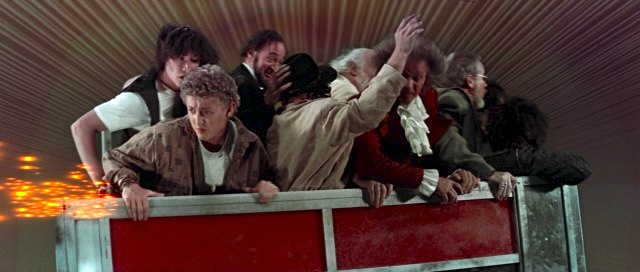
I am not sure if these are ‘twisted’ enough, but some of my favorites are:
Pretty much anything by Guy Gavriel Kay :) (I love the Sarantine Mosaic the best – Lions of Al-Rassan is part of that universe and I think Tigana also is.). It might not quite count becuase it’s not specifically Earth, but the stories in that world are loosely based on specific historic periods and personalities.
Juliet Marillier has already been mentioned in other posts for her Celtic books, but she has also written some other amazing stuff set in other periods (and it is meant to be Earth) and also has some really interesting plots surrounding the interaction of pagans and early Christians in a nuanced and non stereotypical way (the Wolfksin/Foxmask duology is one of my faaaaavorites).
I don’t care for Piers Anthony’s Xanth books at all (I stopped after three of them and find them puerile and offensive) but before I bounced off of Xanth, back in college I read his alternate history series (Geodyssey?) that basically traces history starting with pre-history through a few families that he follows. It was pretty interesting (althuogh I definitely remember one of the characters had a really overtly sexualized plot that I skimmed through most of).
There are probably lots of other ones I am forgetting that I’ve read over the years…although maybe they don’t count as twisty.
Marie Brennan’s Lady Trent books? 19th century travelogues in an alternate reality with dragons and majority Judaism.
Zen Cho’s Sorcerer to the Crown is a Regency England with magic and with postcolonial politics.
And Mary Gentle’s Ash, set in, er, a very different 15th Century and doing very interesting things with history, the telling of history and the diverging of it.
The Anubis Gates is a worthy contender for best overall effort. It’s a heck of a book.
In more serious works, I would add Gregory Benford’s Timescape and Orson Scott Card’s Pastwatch, both of which played with time travel rather well. Both of those are probably still out in the public areas of the house, along with most of Guy Gavriel Kay’s works.
For the more playful parts of the house I think you really need to explicitly name Eric Flint’s 1632 series for sheer volume of output. There is a staggering amount of research been done in that space in the name of a decent story.
His and David Weber’s Belisarius books are unashamed good fun too.
And in the darker areas you have to include Keith Laumer’s Dinosaur Beach, where the timeways are twisted in all directions.
The Dragon Waiting: A Masque of History by John M. Ford. Julian the Apostate is known as the Blessed Julian, Christianity is an obscure hill cult, magic exists within certain strict limits, and vampirism is a dread disease.
–deleted because it was too snarky—
Dan Simmons is of course well-regarded for his Hyperion Cantos, but I actually prefer Illium/Olympos.
Not exactly history-twisting, but highly intertextual with Homer in a way that’s just as satisfying.
Mumbo Jumbo by Ishmael Reed
How about Harry Harrison’s East of Eden trilogy? A certain asteroid didn’t slam into Chicxulub …
I’d also mention Neal Stephenson’s Cryptonomicon and Baroque Cycle.
Dunno how much actual twisting it does, but I have to give a shout here to Michael Moorcock for Behold The Man.
If we’re bringing up Keith Laumer, one of my all time favorites is Time Trap which is definitely not at the dark end of the spectrum.